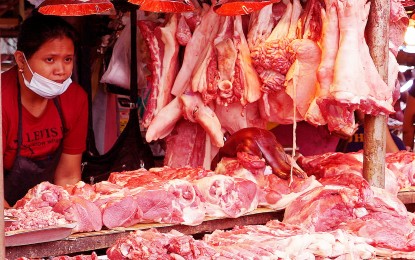
File photo
MANILA – A lawmaker at the House of Representatives has filed a measure authorizing the President to directly procure pork in times of emergency to effectively and immediately address any crisis situations that disrupt the supply of pork.
In filing House Bill 9256 or the Affordable Pork Act of 2021, Marikina City Rep. Stella Quimbo said only the government would have the ability to “buy high” from local producers and “sell low” to consumers.
Quimbo said allowing government to directly procure meat ensures that any tariff reduction will translate to lower pork prices in the market as it becomes the source of competition for importers.
“With government acting as the “middleman,” it can ensure that pork is bought from local hog raisers at a reasonable price, then sold at a retail price that is competitive with imports. In effect, government provides a price support to local producers during the crisis, while also ensuring consumers can buy pork at the lowest possible prices,” she said in a separate statement on Thursday.
She said the bill also allows local importers to be insulated from threats of competition while it transitions to more efficient production methods and better protection against the African swine fever (ASF).
“The bill authorizes the President to directly procure pork in times of emergency in order to sell in the market. In the current situation, local producers must be able to sell their supply at a price that is high enough to help them recover costs,” she said.
To help those impacted by the recent calamities and to facilitate the development of the local hog industry, the measure provides that all tariff revenues from pork imports for the next six years shall be earmarked towards a swine competitiveness enhancement fund (SCEF).
“Gagamitin ang SCEF para palakasin ang local hog industry. Popondohan nito ang bakuna kontra ASF, subsidies para sa transportation ng pork meat, development programs, pautang sa mga hog raisers, at insurance (The SCEF will be used to strengthen the local hog industry. This will fund protection against ASF, subsidies for transportation of pork meat, development programs, credit assistance for hog raisers, and insurance),” she said.
To facilitate more efficient investigation and prosecution of cases of anti-competitive behavior in the pork supply chain, the bill directs the Department of Agriculture and the Bureau of Customs to provide the Philippine Competition Commission with necessary information to evaluate the pork meat industry.
She said higher penalties will also be imposed on smugglers of pork meat, suffering the penalty of life imprisonment and a fine of thrice the fair value of smuggled pork products and the aggregate amount of the taxes, duties, and other charges avoided.
Finally, to ensure that minimum access volume (MAV) allocations and the benefits from lower tariff rates are maximized, the measure proposes that import permits shall be deemed approved if an agency fails to act on the same within the prescribed period.
“Ang layunin ng panukala ko: protektahan ang local hog industry, pati na rin ang consuming public. With HB 9256, magiging mas mababa at patas ang presyo sa merkado, at titibay din ang industriya ng baboy (The goal of my bill is to protect the local hog industry, as well as the consuming public. With HB 9256, the price [of pork] would be fairer and lower in the market, and the hog industry would be strengthened),” she said.
Executive Order 128, which President Rodrigo R. Duterte signed last April 7, reduces levy on pork imports under the minimum access volume (MAV) from 30 percent to 5 percent for the first three months upon the EO’s effectivity, and 10 percent in the succeeding nine months.
Tariffs of pork imports outside of MAV were proposed to be reduced from the current 40 percent to 15 percent for the first three months, and 20 percent for the succeeding three quarters.
Department of Finance Secretary Carlos Dominguez III said the EO is an emergency measure targeted to ensure an adequate supply of pork in the country and to help stabilize pork prices.
This as prices of pork has risen to over PHP300 a kilo from around PHP200 before the supply issues and has contributed to the elevated domestic inflation rate. (PNA)
